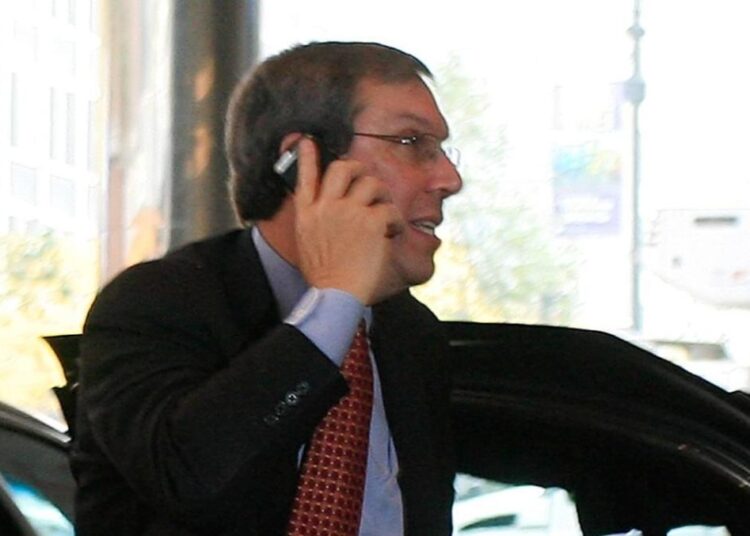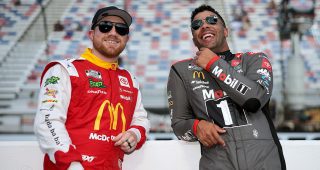23XI Racing, which is owned by Michael Jordan and Denny Hamlin, and Front Row Motorsports filed a brief Monday morning urging U.S. District Judge Kenneth D. Bell to deny NASCAR’s motion for a stay of a preliminary injunction. Unless stayed by Bell or vacated on appeal to the U.S. Court of Appeals for the Fourth Circuit, the injunction will block NASCAR from denying the two teams the same terms offered to charter teams and ensure they are not compelled to release legal claims against NASCAR.
When he partially granted NASCAR’s motion for an expedited review of the demanded stay last Friday, Bell instructed the plaintiffs, who are led by attorney Jeffrey Kessler, to file a brief no later than 10 a.m. Monday. Bell indicated he will issue a ruling on NASCAR’s motion for a stay at some point on Monday.
More from Sportico.com
The plaintiffs’ brief, signed by Kessler, escalates an already acrimonious litigation where NASCAR is accused of abusing monopsony power over racing teams while 23XI Racing and Front Row are depicted as abusing the legal process to renegotiate a failed business deal.
The brief depicts NASCAR and co-defendant CEO Jim France as resorting to litigation theatrics to mask legal deficiencies.
“When a litigant does not have either the law or the facts on its side, it will pound the table,” the brief charges, adding “Defendants’ pounding has become tired, familiar, and shrill.” The brief contends NASCAR is “simply rearguing—but louder—the same points that this Court has already heard and properly rejected.”
To that end, the brief criticizes NASCAR’s argument it was not given a fair chance to respond to charter transfer issues related to 23XI Racing and Front Row’s plan to purchase two Stewart-Haas Racing (SHR) charters. The charters would let the two teams compete. As the brief tells it, NASCAR previously and unsuccessfully made that same argument, except now is using an “elevated tone” as if that is a differentiator.
The brief also argues that when the plaintiffs’ lawsuit was filed a few months ago, neither 23XI Racing nor Front Row “had any reason to suspect” that NASCAR would block the transfers unless they contractually waived their right to sue. The brief claims that a few weeks before the lawsuit began, NASCAR president Steve Phelps “informed Front Row that its SHR transfer was approved” and all that separated formal approval was, as the brief puts it, the “ministerial task of submitting some paperwork.” But in December, NASCAR told Front Row that it would not approve the transfer. The brief contends, “the only intervening event was Front Row filing this lawsuit.”
The brief acknowledges that NASCAR has raised “multiple questions” about “23XI’s compliance with the Team Owner and Control Person requirements of the Charter” but insists those questions are pretextual. There can be no “legitimate questions” of whether 23XI owners could be classified as “Prohibited Persons,” the brief charges, since Jordan and Hamlin have had NASCAR-approved charter agreements “for years.”
The brief also quotes Phelps’ praise of Jordan and Hamlin as inconsistent with the notion they might not be appropriate persons to own a team. Phelps is quoted as saying “I love that Michael Jordan is in our sport. I personally like Michael and think he’s good for the sport.” Phelps’ praise of Hamlin is also stressed. “Denny Hamlin’s … doing a tremendous job … I’d like to have 36 Denny Hamlins.” As the brief sees it, “the only reason” why NASCAR could consider Jordan and Hamlin “prohibited persons” is “because they have asserted their antitrust rights and filed this lawsuit.” Of course, NASCAR could argue that Phelps’ opinion of Jordan and Hamlin has changed because of lawsuit-related arguments and statements that NASCAR contends are untrue.
If Bell grants the stay, the injunction would be sidelined until the Fourth Circuit hears NASCAR’s appeal. That could take weeks or months.
If Bell denies the stay, 23XI Racing and Front Row will have “won” in a near-term sense since they could compete with charter rights and without giving up their legal claims. They could also proceed in their deal with SHR.
But in that scenario, the Fourth Circuit could still reverse Bell and vacate the injunction. Even if the Fourth Circuit affirms Bell, NASCAR could still ultimately win the case, which is set to go to trial next December. Bell has only ruled on an injunction, not on the merits of the plaintiffs’ broader assertion that NASCAR has violated antitrust law. The parties could also reach a settlement at any point.
Best of Sportico.com
Sign up for Sportico’s Newsletter. For the latest news, follow us on Facebook, Twitter, and Instagram.
Read the full article here


























